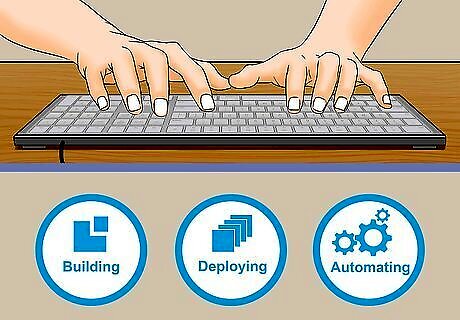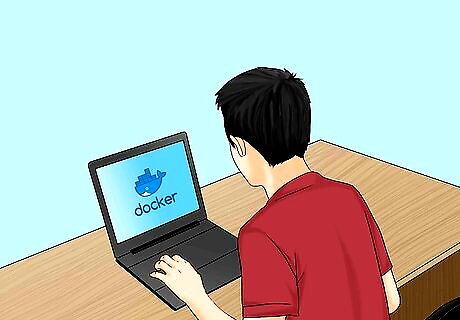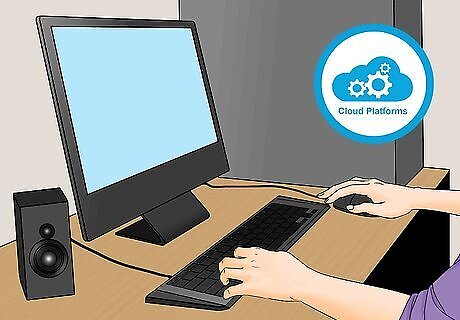
views
Learning Software and Development

Learn a common programming language. Look in your local community college class listings for programming classes and sign up for a course. A strong foundation in programming languages will improve your ability to accurately communicate as a DevOps engineer and gain insight into the needs and limitations of your development team. You don’t have to learn any specific language, choose one that seems applicable to your interests. Online courses are available for many common programming languages, like Python and C++, some of which are free to the public. If you are still in high school, consider majoring in computer science when you go to college.

Gain experience in system administration and server hardware. Maintaining and managing servers will be one of your chief responsibilities as a DevOps engineer. Knowing how to set up web servers, how to do scripting, and how to deploy code are absolutely essential to master for a DevOps position. Consider signing up for an advanced course in coding at a local college, or try to learn through experience in an IT position. You should have at least intermediate knowledge of how server hardware works, and become very well acquainted with the operating systems they use and how to manage them. Open-source operating systems such as Linux and Ubuntu are common in the field and a good way to begin learning server systems.

Get familiar with building, deploying, and automating software. You will need to understand how to create an application and how to automate your code. There are tools available that gather code into a single place and merge builds to be continually tested throughout the day. This helps immensely to reach production deployment goals. Jenkins is a continuous integration and delivery program that does exactly this and is recommended by most DevOps professionals as the most user-friendly of its kind.

Attain a degree in a computer science related field. College graduates with experience in computer science and information technology will find it much easier to be seriously considered for positions in the DevOps engineering field. While it is not essential, a bachelor’s degree will boost your credentials. Universities are fantastic for networking and opening up your career opportunities. Spend as much time as you can in college getting to know professors and they can help to point you on the right track post-graduation.
Moving Beyond Foundational Skills

Learn ‘Infrastructure as Code’ processes. You should tackle configuration management tools after getting a good sense of operations and continuous integration (CI) and deployment (CD). These processes remove much of the manual work required to set up new operating systems, making it easier to create a uniform standard across all systems. Programs such as Chef, Puppet, and Ansible are good for beginners, but there are others available to learn as your skill in CI and CD improves over time.

Understand how proactive monitoring can prevent problems. In the past, monitoring systems meant responding to issues rather than preventing them. Proactive monitoring programs allow you to monitor and identify issues that could arise in the future, such as performance problems and system bottlenecks, and deal with them before they cause issues. There are a host of programs out there designed for proactive monitoring, each with different system focuses. Find one that seems to be easy to grasp, and then branch out to find one that feels comfortable.

Get well acquainted with containers and self-contained environments. A container is essentially a less intensive version of a VirtualBox, a way to run an operating system within an operating system. Containers are useful to run code and test in environments simulating the real thing without affecting the real environment at all. Docker is a popular container program among DevOps professionals that is considered to be easy to navigate even for novices.

Start learning cloud platforms and how they can help DevOps goals. Serverless operations and cloud-dependent infrastructures are becoming more popular each year, and it's important to have working knowledge of the major cloud services. Most cloud services offer certification in their environment, which can help you to stand out among other applicants. Cloud-based servers are not hosted by physical servers and are stored "in the cloud", meaning your data and servers will still be there if a malfunction occurs, whereas a physical server could be corrupted or lose power.
Securing a DevOps Engineer Position

Research the role DevOps engineers play at various companies. The role is slightly different from company to company and is associated with unique responsibilities depending on your employer. A DevOps engineer at Apple Inc. for example serves as a head developer, working closely with development teams as opposed to management, whereas a DevOps engineer at IHeartMedia is more of a system administrator and operations manager than a team developer. You will likely need to inquire personally about DevOps responsibilities at companies you are interested in, preferably in person or over the phone but an email to their HR department may put you on the right track too.

Network with other DevOps professionals. Networking simply means getting to know others in your field and getting your name out there to people who may want to hire you in the future. Attend conferences, become a member of a LinkedIn group, or reach out to prospective employers and companies personally so they know who you are and what skills you can bring to the table.

Bring focus to both your soft and hard skills on your resume. While being a DevOps engineer is a very technical and skilled position, you also need to be able to talk about your people skills. Being able to talk about your creativity, your dedication, your team working ability, and your communication skills is just as important as knowing the technical ins and outs of the DevOps field. Put together a portfolio online that exhibits your work and skills, being sure to include in your resume any letters of recommendation or references who can discuss your personality as well as your technical abilities.

Use DevOps hiring sites to find a broad variety of options. Applying for DevOps engineer positions is the last step in this lengthy process, but it can be difficult to find positions in the local area or even at large companies. Make sure to do your research on a handful of prospective companies, find many different options, and put your best foot forward. You’ve got this! Linkedin has a useful section for job listings and can serve as a way to start connecting with companies that are hiring. Alternatively, you can try IBM DeveloperWorks, Google job postings, and PuppetLabs to broaden your prospects.




















Comments
0 comment